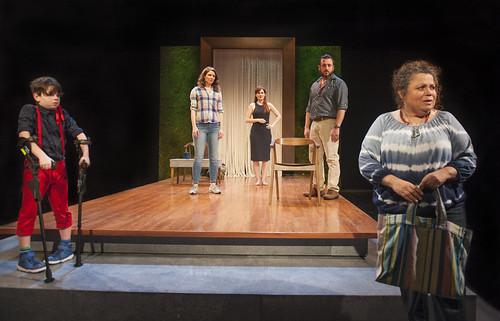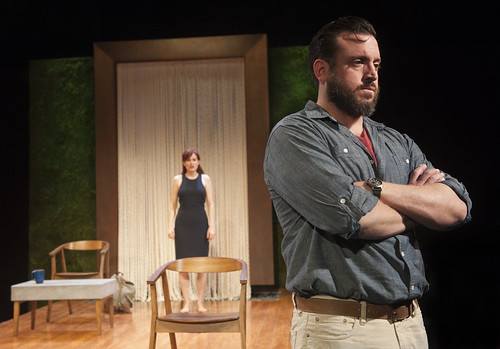Uneasy comedy, drama (+Rat Wife!) in Aurora's Erik
 The Rat Wife (Wilma Bonet, right) stops by to see if Erik (Jack Wittmayer) and his family (from left: Mariah Castle, Marilee Talkington and Joe Estlack) need her help in the world premiere of Little Erik at Aurora Theatre Company. Below: Joie (Marilee Talkington) and Freddie (Joe Estlack) discuss their dysfunctional lives in this contemporary adaptation by Mark Jackson of Ibsen's Little Eyolf. Photos by David Allen
The Rat Wife (Wilma Bonet, right) stops by to see if Erik (Jack Wittmayer) and his family (from left: Mariah Castle, Marilee Talkington and Joe Estlack) need her help in the world premiere of Little Erik at Aurora Theatre Company. Below: Joie (Marilee Talkington) and Freddie (Joe Estlack) discuss their dysfunctional lives in this contemporary adaptation by Mark Jackson of Ibsen's Little Eyolf. Photos by David Allen
There's a profoundly creepy core to Little Erik the new adaptation of Henrik Ibsen's 1894 Little Eyolf by Mark Jackson, one of the Bay Area's foremost theater artists. That creepiness is the best thing about the 80-minute one-act now at the Aurora Theatre Company. Though even in its brevity, the play can't quite command its shifting tones.
Ibsen's Eyolf probably won't be found on any of his best-of compilations, but Jackson seizes on the play's weirdness to explore how self-involvement (which seems so contemporary but has apparently been plaguing humans for quite some time) leads to detachment, which leads to a complicated, unfulfilled life.
At the heart of the play is the tragic death of a child, the titular Erik, and in this production - also directed by Jackson - the child is played with disarming enthusiasm and charm by Jack Wittmayer. Because Wittmayer, who handles Erik's crutches and twisted body like an absolute pro, makes such a strong impression in only a few scenes, it should be absolutely devastating when news arrives that the boy has drowned in the Northern California river just outside his family's slick new mountain getaway home. But it's not, hence the creepiness.
The character of the Rat Catcher, a sort of mystical bit of Pied Piper woo-woo, appears as if in warning that she will gladly allow unwanted or unloved children with her to the bottom of the sea. In Jackson's version, she's a persistent cleaning lady offering her services all around town. As played by Wilma Bonet, the Rat Wife is instantly recognizable, and that grounds her firmly in reality and makes her more mystical aspect even creepier. It's not that hard to be ignored or dismissed if you're a woman of color among wealthy white folks. But you ignore the Rat Wife at your own peril.
Once Erik is dispatched, his remaining family members are mostly too embroiled in their own dramas to grieve all that much. Erik's mom, Joie (the incisive Marilee Talkington) has no illusions about her skills as a mother. She describes herself as "hard" and is proudly and firmly enmeshed in the digital age. Never too far from her phone, she has succeeded in business and admits she never really wanted a child. She had Erik to please her husband, Freddie (Joe Estlack), a man of humble origins who has just returned from a mysterious six months abroad (courtesy of his wife's credit cards) while he was supposedly finishing his magnum opus novel about responsibility. But now, after an epiphany, he is a writer who no longer writes. He realizes he has never had to be responsible in his life, so now he has eschewed writing and technology and - oops! - just wants to be a dad to Erik.
In many ways, Little Erik is the story of a failed marriage, but that failure is really the result of monumental egos that could occasionally crash into each other (apparently the sex was great) but could never truly mesh. On the periphery of the marriage is Andi (Mariah Castle, Freddie's half-sister, who picked up the pieces after their father's death when Freddie was skittering around the globe. Andi was the closest to Erik, but even her naturally warm, maternal nature gets hijacked by a questionable romance, and it's not the one with the architect who built the house (Gregy Ayers as Bernie, a character who seems to have dropped in from another play).
Jackson gets off some terrific lines here. My favorite is the acerbic Joie: "Children are not the future. Old people are the future. Nobody gets younger." But the play's ending is pretty ridiculous, perhaps on purpose given that the shifting from realism to hysterical drama to mysticism to outright comedy has the audience on shaky ground. Perhaps Jackson the writer and Jackson the director had different visions of where the play was headed. Certainly the actors, all of whom are terrific, are capable of giving Jackson what he wants. They tend to humanize their extreme characters and win some sympathy.
The severe simplicity and beauty of the set (by Nina Ball) create a sharp environment, and the effective video designs (by Wolfgang Lancelot Wachalovsky) and wonderfully unnerving sound design (by Matt Stines) indicate a much more serious enterprise than what we actually get.
In the end, Little Erik feels neither comic nor tragic nor fully developed. It's go that ever-present creepy factor, and that's certainly something.
FOR MORE INFORMATIONMark Jackson's Little Erik continues through Feb. 28 at Aurora Theatre Company, 2081 Addison St., Berkeley. Tickets are $32-$50. Call 510-843-4822 or visit www.auroratheatre.org.
